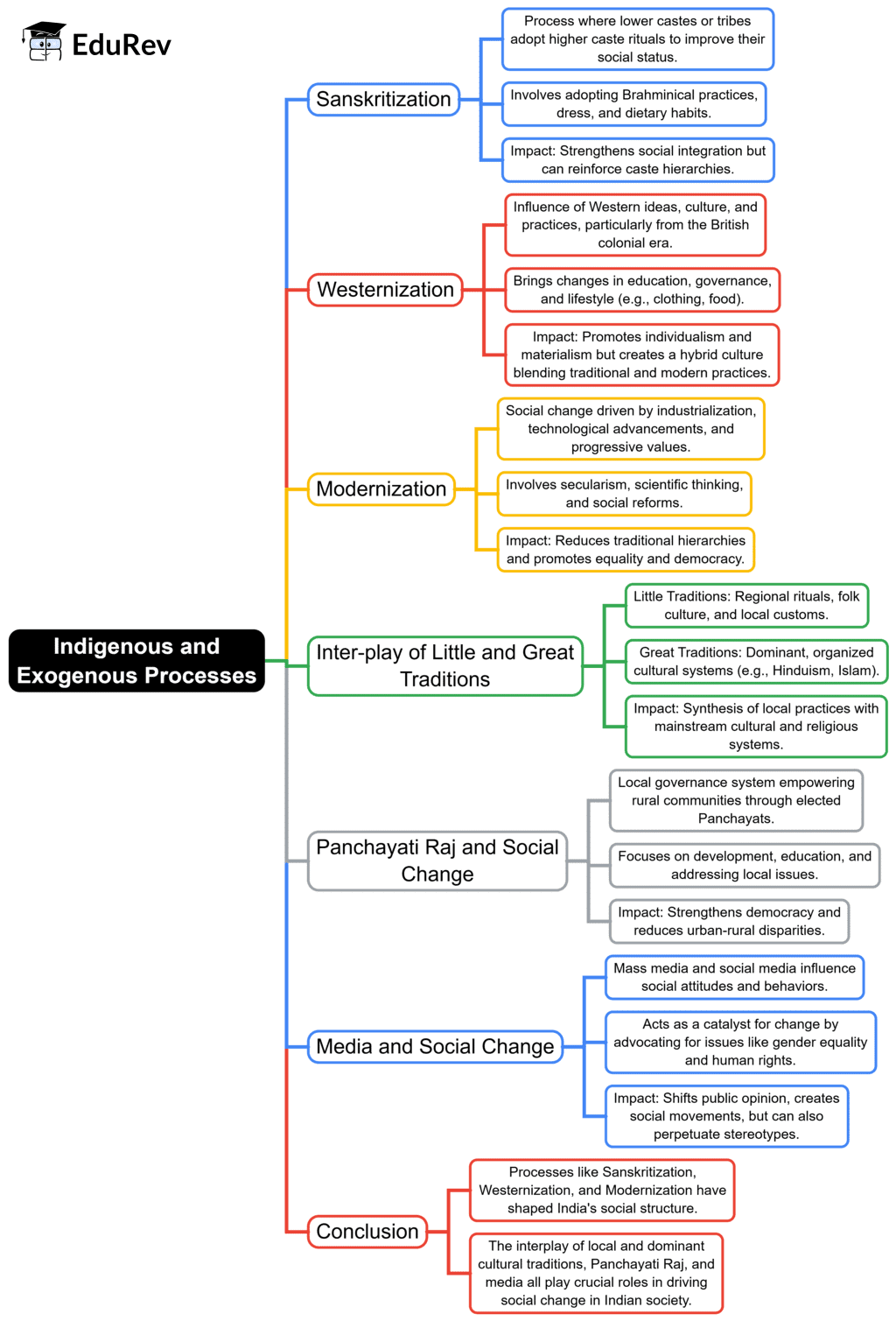UPSC Exam > UPSC Notes > Anthropology Optional for UPSC > Mind Map: Indigenous and Exogenous Processes of Socio-Cultural Change in Indian Society
Mind Map: Indigenous and Exogenous Processes of Socio-Cultural Change in Indian Society | Anthropology Optional for UPSC PDF Download

The document Mind Map: Indigenous and Exogenous Processes of Socio-Cultural Change in Indian Society | Anthropology Optional for UPSC is a part of the UPSC Course Anthropology Optional for UPSC.
All you need of UPSC at this link: UPSC
|
209 videos|299 docs
|
FAQs on Mind Map: Indigenous and Exogenous Processes of Socio-Cultural Change in Indian Society - Anthropology Optional for UPSC
| 1. What are the indigenous processes of socio-cultural change in Indian society? |  |
Ans. Indigenous processes of socio-cultural change in Indian society refer to the internal dynamics that shape cultural practices, beliefs, and social structures. These include traditional practices, local customs, community interactions, and the influence of historical events, such as the impact of colonialism and the freedom struggle. The preservation and adaptation of indigenous knowledge systems, languages, and arts also play a vital role in these processes.
| 2. How do exogenous processes impact socio-cultural change in India? |  |
Ans. Exogenous processes refer to external factors that influence socio-cultural change in India. These include globalization, migration, technological advancements, and the spread of Western culture. Such influences can lead to the adoption of new lifestyles, changes in consumption patterns, and shifts in social values. The interaction between local traditions and global trends often results in hybrid cultures, where elements from both indigenous and exogenous sources coexist.
| 3. What role does education play in socio-cultural change in Indian society? |  |
Ans. Education plays a crucial role in facilitating socio-cultural change in Indian society. It promotes awareness of social issues, encourages critical thinking, and helps individuals to challenge traditional norms. Education can empower marginalized communities, foster gender equality, and enhance economic opportunities. Additionally, it serves as a medium for the transmission of both indigenous knowledge and global perspectives.
| 4. How does migration contribute to socio-cultural change in India? |  |
Ans. Migration, both internal and international, significantly contributes to socio-cultural change in India by facilitating the exchange of ideas, practices, and lifestyles. Migrants often bring new cultural elements to their host communities, leading to cultural assimilation and hybridization. This process can result in shifts in social structures, labor markets, and community relationships, as well as the blending of diverse cultural identities.
| 5. What are the challenges faced by indigenous cultures in the context of socio-cultural change? |  |
Ans. Indigenous cultures in India face several challenges in the context of socio-cultural change, including the loss of traditional practices and languages due to globalization and urbanization. Economic pressures, land displacement, and the influence of dominant cultures can lead to cultural erosion. Additionally, the struggle to preserve cultural identity in a rapidly changing socio-economic landscape poses significant threats to indigenous communities, requiring concerted efforts for cultural revival and sustainability.
Related Searches















